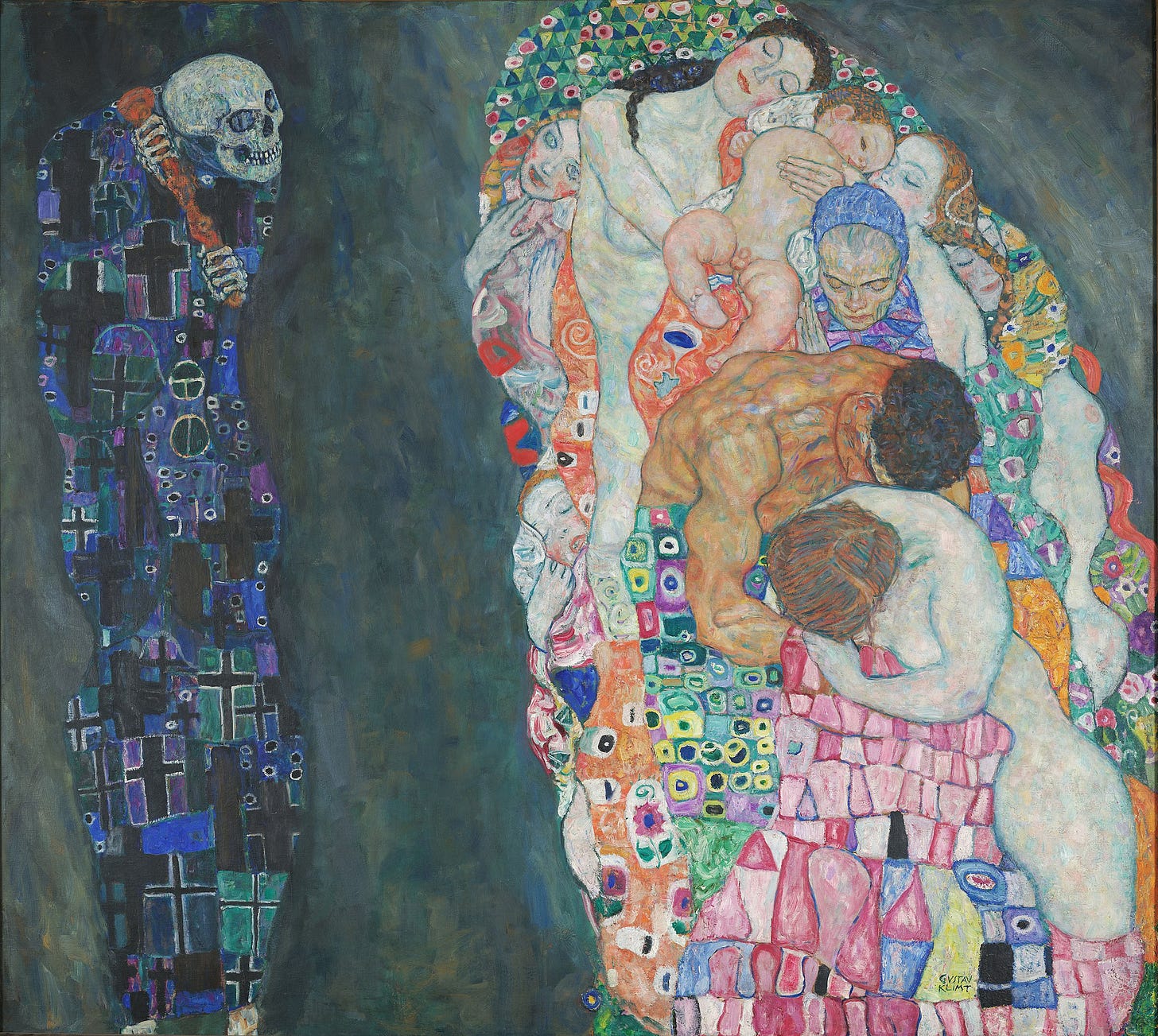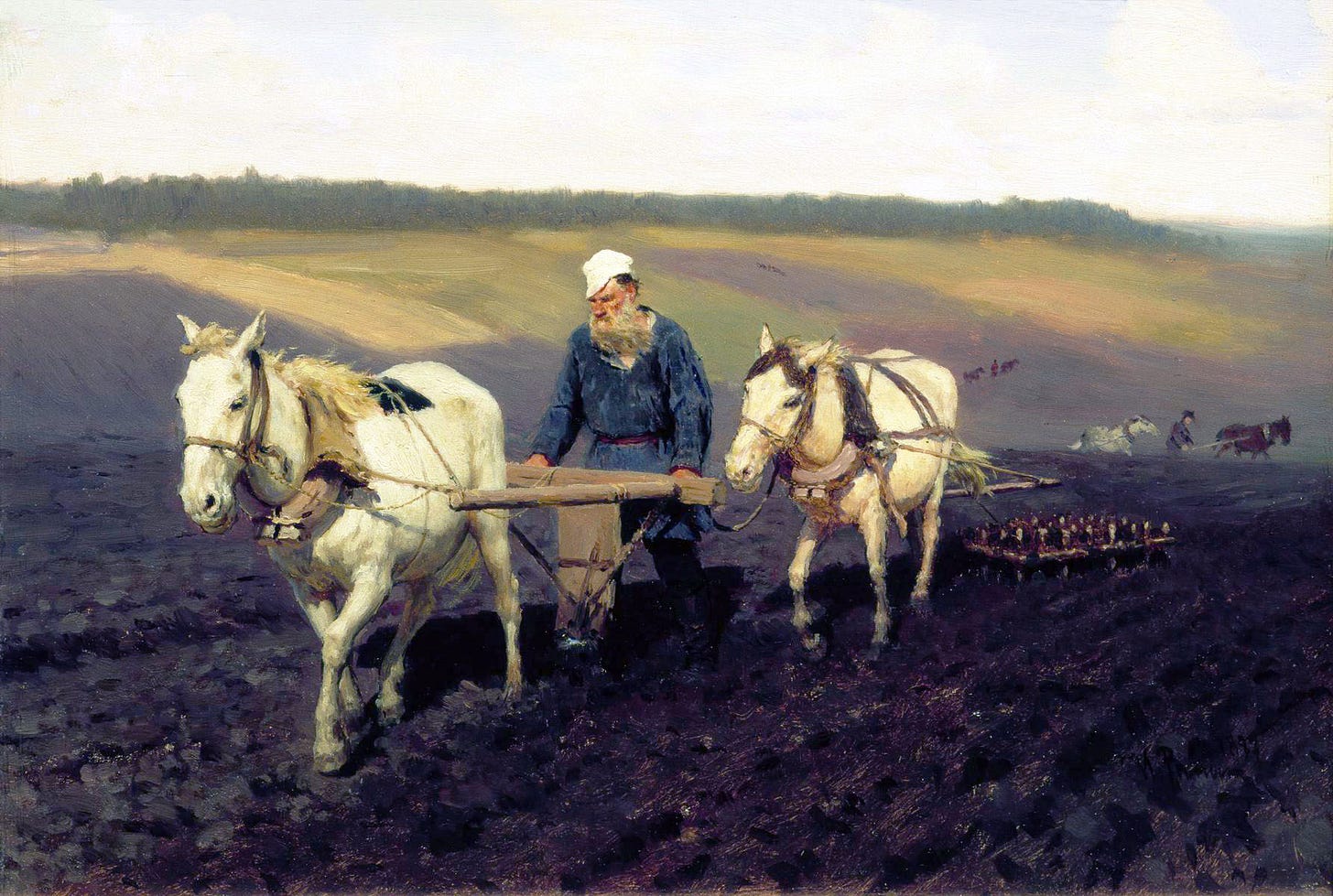First thoughts
I am a little lost for words this week.
Fortunately for us, Tolosty wasn't. The world is in this book, and this week we felt so much.
Pierre watched all meaning drain away, only to have it returned to him by a round man with magical potatoes. Platon showed him a different path through life's adversities. And I think may have saved our hero's life.
Marya has spent so long turning circles in her father's house. This week we see her a blaze of energy. Her own fiery comet.
And Andrei. A man who tried to love life, finds peace at last in the solemn mystery of death.
It's a momentous week in War and Peace, with so much to think and talk about.
So I’ve made this week’s newsletter entirely free. Do have a read, and let me know your thoughts.
Character cheat sheet
Some minor characters we met this week…
Platon Karataev We only briefly meet this peasant soldier in captivity with Pierre Bezukhov, but he has a special importance to the novel and Pierre’s journey. At our protagonist’s lowest ebb, he gives Pierre another way to respond to life’s adversities.
Mademoiselle Bourienne Marya’s French companion travels with her to see the Rostovs at Yaroslavl. She flirted with Anatole, and Marya’s father talked of marrying her. She has been an inconstant and dubious friend to the princess.
Monsieur Dessalles The young prince Nikolai’s Swiss tutor also accompanies them.
Nikolushka Andrei’s seven-year-old son has seen very little of his father these past few years.
Discussion Questions
Imagine Pierre met Platon instead of the freemason Bazdéev after his duel with Dolokhov. What would Pierre have thought of Platon?
How has Marya changed since the start of the novel?
What was Andrei searching for in War and Peace? Did he find it?
Magic potatoes
War and Peace: one man’s epic quest for the perfect potato. Pierre’s world is collapsing “into a heap of meaningless rubbish.” He’s given up all hope in “the meaning of life.” He has lost everything: family, friends, home, freedom, peace of mind and belief in the goodness of humanity. How can he survive captivity as a Prisoner of War?
But here, he meets Platon Karataev, a very round and softly-spoken peasant. Platon offers him some salted potatoes, and Pierre thinks, “he had never eaten anything that tasted better.” This made me smile: he thought the same when eating the soldiers’ mash after the Battle of Borodino. But then again, Pierre is prone to hyperbole.
Pierre’s exchange with the soldiers was awkward. He glossed over his aristocratic background and hesitated over giving them money. The social distance between him and Platon is no less great, but their exchange is more natural and fruitful.
Both men have suffered a great deal and ended up in the same miserable situation. But Platon has persevered where Pierre has floundered. The peasant’s name is a Russian variation of the philosopher Plato and means “broad-shouldered.” With stoic philosophy and some well-worn sayings, he lives lovingly and with laughter. After so many grim chapters, he offers us some badly needed hope.
But is he too good to be true? Is Platon a Pollyanna? Or a romanticised idea of the Russian peasant?
Tolstoy had a lifelong obsession with the virtues of a simple peasant’s life, leading him to renounce his wealth and title later in life. Idealised peasants crop up elsewhere in his fiction: Nikita in Master and Man, and Gerasim in The Death of Ivan Ilyich.
I find Platon the least convincing character in War and Peace. But more than any other character, I want to be convinced by him. And that’s kind of the point. In a book that is all about seeking meaning in life, Platon appears in the darkest moment with a lantern to lead us out. Or, at least, a magic potato.
Marya’s journey
Meanwhile, Princess Marya Bolkonskaya has never been so happy. And so sad:
But this happiness on one side of her spiritual nature did not prevent her feeling grief for her brother with full force; on the contrary that spiritual tranquility on the one side made it the more possible for her to give full play to her feeling for her brother.
She spent most of the book cooped up in her father’s house at Bald Hills, dreaming of becoming a penniless pilgrim. Now she is racing 500 miles across a dangerous country between Voronezh and Yaroslavl. Her “energy and firmness of spirit” astonishes everyone around her. She is up early and to bed late. And despite all the emotions coursing through her, she stays calm when she meets the Rostovs.
I would happily read a whole novel about this new energetic Marya, seemingly capable of anything. Several events have led to this change: the death of her father, the loss of her home, and meeting Nikolai. And yet she remains the same Marya, driven by duty and loyalty to her family.
And this I think is significant. The dowdy princess that Anatole met at the start of the novel is the same radiant Marya rushing to her brother’s deathbed. One of the overarching themes of War and Peace is that first impressions are usually deceptive. And we should never underestimate someone’s capacity to astonish.
The bittersweet note of this chapter is that Marya’s rising happiness inevitably comes at the end of Andrei’s own long-suffering journey.

The solemn mystery
When we last saw Andrei, he was seeing visions in his darkened room. These included two sphinxes, mythological beasts found guarding gateways and setting riddles. Now, at the end, Prince Bolkonsky dreams of a door:
…a single question, that of the closed door, superseded all else. He rose and went to the door to bolt and lock it. Everything depended on whether he was, or was not, in time to lock it. he went, and tried to hurry, but his legs refused to move and he knew he would not be in time to lock the door though he painfully strained all his powers. He was seized by an agnozing fear. And that fear was the fear of death. It stood behind the door.
A long time ago, Andrei stood on the other side of another door. He tried to open it but “someone was holding it shut.” Behind that door, his son was being born, and his wife was dying. Life and death, just out of reach.
Tolstoy planned to kill Andrei off at Austerlitz, “a brilliant young man” cut down in his prime. So much unrealised potential. A tragic waste of life. But Tolstoy’s decision to save Andrei sets up a far greater tragedy. A man desperate to love life and feel more, but unable to open that door onto the mysteries of life.
Superficially, he is like Boris Drubetskoy. Young, intelligent and ambitious – destined for greatness. But unlike Boris, he senses there is more to life. He glimpses it in the lofty sky at Austerlitz, on a ferry with his old friend Pierre, and in a moonlit night at the Rostovs’ country house. He even senses it in the buzzing of a fly, drawn to his festering flesh.
But he can never get that door open. He stands before the sphinxes but cannot answer their riddle. Only now, at the end, does a solution appear to him:
‘Love hinders death. Love is life. All, everything that I understand, I understand only because I love. Everything is, everything exists, only because I love. Everthing is united by it alone. Love is God, and to die means that I, a particle of love, shall return to the general and eternal source.’ These thoughts seemed to him comforting. But the were only thoughts. Something was lacking in them, they were not clear, they were too one-sidedly personal and brain-spun.
His revelation is not similar to Platon’s wisdom: all is love. But it is a hollow realisation because Andrei only understands it intellectually, whereas Platon knows it in his whole being. And while Platon has lived his life according to this philosophy, Andrei has repeatedly failed to do so.
This tragedy is far more affecting than if Andrei had died at Austerlitz. We weren’t sure if we even liked him back then. But having watched him over and over again reach to open the door of life, we know he will never make it to the other side. Instead, we witness an even greater mystery, as he makes peace with his death as an awakening of its own.
Tolstoy’s obsession
I’ve run out of time and space to discuss the last two chapters in this week’s reading, and Tolstoy’s ongoing obsession with the Great Men theory of history. No matter, we will return to this topic next week!
Join the discussion
There is a lot I haven’t covered here, including the realism of Andrei’s death. Let me know your thoughts in the comments. Next year, I will organise the discussion in the chat area of
. This year, you can also connect with other readers in the group chat on Instagram and the Discord server. Let me know if you want to be added to either of these.Choose your own adventure
Thank you for reading this Whisky and Perseverance update from me,
. You can pick and mix which letters you want to receive by turning off and on notifications on your manage subscription page. By default, you won’t receive read-along updates unless you choose to join.








I was writing a poem on Friday to a prompt that asked me to start each line with “I had the happy idea....” and also the invitation to complicate this. One line of my poem came out of my feelings about this week’s reading:
“I had the happy idea that death can be more than a hole in a story, / that it can be a door called conundrum / and coalescence.”